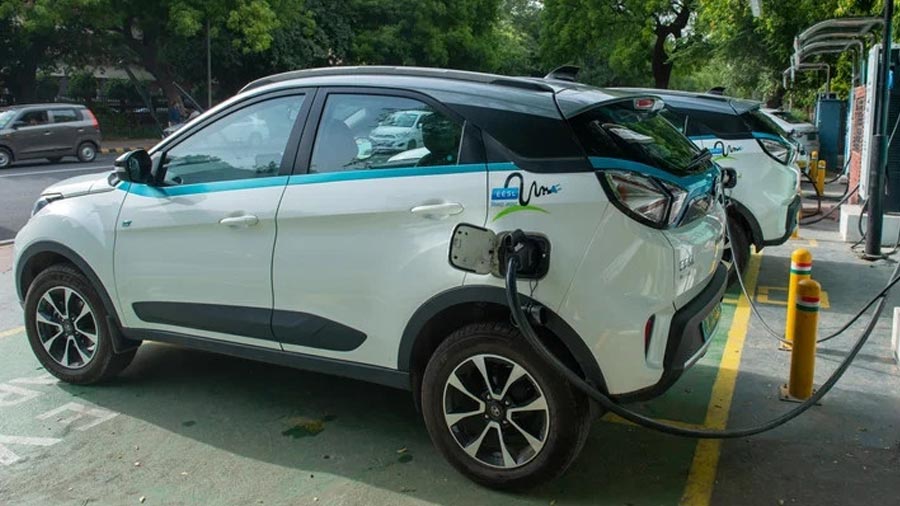India’s Electric Vehicle Growth Lags Behind Southeast Asia and Latin America in Global Landscape

Electric vehicle (EV) sales have seen a remarkable increase globally, surpassing 17 million units in 2024, according to the International Energy Agency’s (IEA) Global EV Outlook 2025. However, India is struggling to keep pace with its peers, achieving only a modest 2% penetration of total car sales. While countries like Brazil and Vietnam have experienced significant growth in their EV markets, India’s adoption remains hindered by several factors, including pricing and infrastructure challenges.
Global EV Sales Surge
The global electric vehicle market has witnessed unprecedented growth, with sales exceeding 17 million units in 2024. This surge represents a significant milestone, as electric vehicles accounted for more than 20% of new car sales worldwide. The IEA projects that this figure could rise to 25% in 2025, with overall sales expected to surpass 20 million units. China continues to dominate the market, contributing nearly two-thirds of global EV sales with over 11 million units sold. In China, nearly half of all cars sold last year were electric, showcasing the country’s commitment to EV adoption.
Southeast Asia is emerging as a rapidly growing market for electric vehicles, with sales in the region increasing by nearly 50%. Countries like Thailand, Indonesia, and Vietnam are leading this growth. Despite a 10% drop in absolute sales, Thailand’s EV market share rose to 13%, driven by a decline in conventional car sales. Vietnam’s market share surged to 17%, bolstered by the domestic manufacturer VinFast, which has begun exporting its vehicles to Southeast Asia and the United States.
India’s EV Market Performance
In contrast to the global trend, India’s electric vehicle market is lagging, with only about 100,000 electric cars sold in 2024, translating to a mere 2% share of total car sales. While this marks an improvement, it pales in comparison to the growth seen in Brazil and Vietnam. Brazil’s EV sales more than doubled to 125,000 units, achieving a 6.5% share of total car sales. The IEA’s report highlights that India’s growth is constrained by several factors, including pricing disparities, weaker policy incentives for electric cars compared to two- and three-wheelers, and a slower pace of infrastructure development.
Despite these challenges, there are signs of progress. In the first quarter of 2025, India’s EV sales rose by 45% year-on-year, reaching nearly 35,000 units. However, the country’s market share remains below that of its regional counterparts. Tata Motors continues to dominate the Indian EV market, but new entrants and joint ventures are beginning to emerge, indicating a potential shift in the competitive landscape.
Challenges Facing India’s EV Adoption
The IEA report identifies several key challenges that India must address to enhance its electric vehicle adoption. One major issue is the pricing gap between electric and conventional vehicles, which deters potential buyers. Additionally, the lack of robust policy incentives for electric cars, especially when compared to two- and three-wheelers, hampers growth. The slow development of charging infrastructure also poses a significant barrier to widespread EV adoption.
To improve its standing in the global EV market, India will need to focus on increasing affordability, providing clearer policy signals, and scaling up domestic production. The report suggests that these measures are crucial for fostering a more conducive environment for electric vehicles. As the global market continues to evolve, India’s performance will depend on its ability to overcome these challenges and capitalize on the growing demand for electric vehicles.
Future Outlook for Electric Vehicles
Looking ahead, the future of electric vehicles appears promising, with the IEA projecting that emerging economies outside of China will double their EV sales to 1 million units in the coming year. China, Europe, and the United States are expected to remain dominant markets, but the growth in emerging markets highlights a shift in the global automotive landscape.
India’s ability to catch up with its peers will largely depend on its commitment to addressing the existing barriers to EV adoption. By enhancing affordability, improving policy frameworks, and investing in infrastructure, India can position itself as a competitive player in the global electric vehicle market. As the world moves towards sustainable transportation solutions, the stakes for India are high, and the coming years will be critical in determining its trajectory in the EV sector.
Observer Voice is the one stop site for National, International news, Sports, Editor’s Choice, Art/culture contents, Quotes and much more. We also cover historical contents. Historical contents includes World History, Indian History, and what happened today. The website also covers Entertainment across the India and World.
Follow Us on Twitter, Instagram, Facebook, & LinkedIn

